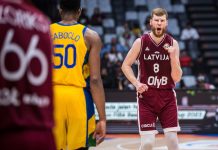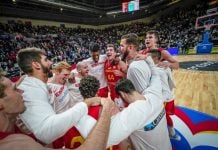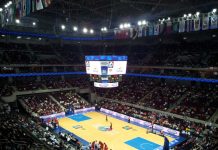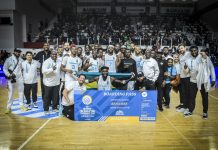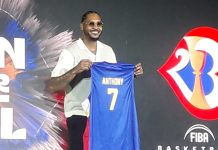Brazil’s Tiago Splitter says that the knowledge of guarding Argentina’s Luis Scola in NBA matches was the key in their 85-65 win in the FIBA World Cup, Round of 16 game on Sunday.
Scola, up until Sunday’s clash with Brazil had been averaging a tournament-best 22 points-a-game. But with the Indiana Pacers’ forward playing against non-NBA forwards in group play, he adjusted quickly and at times dominated against his Group B match-ups.
Then in Madrid, Scola squared off against San Antonio’s Tiago Splitter with Washington Wizards big man, Nene coming off the bench. Cleveland Cavaliers center Anderson Verejao was occasionally on hand as well.
The plan was to frustrate Argentina’s key player; the only one averaging double-figures in scoring for his team. Brazil coach Ruben Magnano frequently switched 2.11m tall Splitter and 2.11m Nene on 2.06m Scola and the sheer size and patience defensively in the post worked, as Scola was held to a tournament low 9 points on 20 percent shooting.
“We tried to switch a lot, and the pick-and-rolls, which is their major plays that they do in the game,” Splitter said.
“I think we did a good job on that. We played good D, one-on-one because we had some mis-matches but we still played our game, played good D, crash the rebounds and running for the fast break.”
Both teams are very different from each other, Brazil’s pace, and transition game offensively was always going to be a problem for the methodical Argentinians. All they had to do to take Scola out of the game and challenge someone clad in black and sky blue to step up.
New York Knicks’ guard Pablo Prigioni was that man, but his game is not based on scoring. He led Argentina with 18 points, but he isn’t an all-out scorer.
“We know the danger that Luis Scola brings in international play,” said Brazil guard Marcelinho Huertas. “We had to quieten him a bit and focus on our offence, and it was on me to play transition because Argentina has a weakness of playing defence against fast breaks and it showed.”
Brazil scored 14 fast break points to Argentina’s zero. Prigioni and Scola ended the game in foul trouble, and for the latter, he knew that Brazil had him figured out. Afterwards in the mixed zone, he answered every question hurriedly, and became agitated when asked about Argentina’s group of players, most notably himself, Manu Ginobili and Carlos Delfino, the latter two, not playing in this World Cup due to injury.
“What group,” Scola said. “Manu is not here. Manu hasn’t been here in a couple of years. Delfino’s not here. What is this group? We keep talking about a group but it doesn’t exist. We keep changing players every year and it’s probably two or three players that played in the Olympics before that won medals so what is exactly this group?”
It is understandable for Scola to be frustrated. He said afterwards that Brazil deserved the victory and that he couldn’t think of a proper post-game analysis for the assembled media in Madrid. Scola, like Prigioni were also unable to give a hint as to their international futures.
“I am still healthy, I don’t know what will happen,” Scola said. “I never said that I will leave the national team after FIBA World Cup.”
Brazil now face Serbia in the World Cup quarter-finals in Madrid on Wednesday evening.
Photo: FIBA

